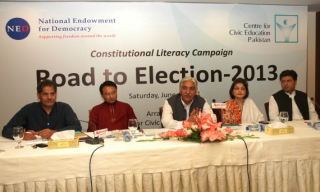ISLAMABAD. June 4, 2011: Speakers at roundtable on, “Road to Election 2013” have pinned hope that reforms in the Election Commission of Pakistan (ECP) under the 18th Amendment and collaborative effort of the ECP and National Database and Registration Authority (NADRA) to prepare error free Computerized Electoral Rolls will enrich Pakistani democracy.
The roundtable was arranged by the Centre for Civic Education in collaboration with the National Endowment for Democracy (NED), Leader of the House in the Senate, Syed Nayyer Hussain Bokhari, MNA Farah Naz Isphani, Deputy Chairman NADRA, Tariq Malik, Wilson Lee of NED and Zafarullah Khan addressed the meeting.
National Database and Registration Authority (NADRA) will print the Final Electoral Rolls by March 2012 to help the Election Commission of Pakistan (ECP) achieve the objective of ‘One CNIC One Vote’ in the General Elections to be held in 2013, informed Tariq Malik, Deputy Chairman of NADRA. “Before we took up the assignment at NADRA some three years ago there was only 55% of the population registered with the Authority. But now the percentage of the registered population stands at 91 percent”, Malik said.
Giving the province-wise breakdown of the registration he said they had registered 98 percent population of Khyber Pakhtunkhwa, 82 percent in Federally Administered Tribal Areas, 92 percent in Punjab, 85 percent in Sindh, 73 percent in Balochistan, 99 percent in Islamabad and Azad Jammu and Kashmir. “In Sindh and Balochistan the ratio of women registered has increased to 78 percent as compared to the previous ratio of 28 percent,” he added.
Malik also said that over the last three years NADRA had already developed a large finger prints and facial galleries through biometric data collection system which would help in achieving the goal set by the ECP. Moreover he said that NADRA has initiated a number of verification methods to ensure that no fake registrations are made during ECP’s door to door enumeration campaign to be held in July-August 2011. He hoped that the Electoral Rolls Project which is being jointly implemented by NADRA and ECP will help achieve the objectives.
Earlier, Zafarullah Khan, Executive Director Centre for Civic Education, during his presentation on the changes brought about in the Election Commission of Pakistan after the 18th Amendment said: “The Presidential discretion has been omitted in appointment of the Chief Election Commissioner and the overall functioning of the ECP. This has put a full stop to the military dictators to hold referendums”.
He said earlier there was no explanation of the mandate of the caretaker government but after the 18th Amendment it has been categorically defined.
Mr. Khan threw light on some other articles which have been amended and have implications on the national electoral processes. Such articles include the Article 17 which gives the Freedom of Association (Political Parties Order 2002), Article 48 (5) Election within 90 days of dissolution.
“With the changes in Article 48 (6) it is the Prime Minister’s prerogative to hold referendum on any matter of national importance (after approval in a joint sitting of the Parliament),” Mr. Khan said adding that this means there can be no referendum by the military dictators and usurpers and that there can be no referendum if there is no parliament since the question of the referendum has to be framed and discussed in the parliament.
Among others who shared their views during the roundtable conference includes Senator Nayyar Hussain Bukhari and Farah Naz Isphahani.

